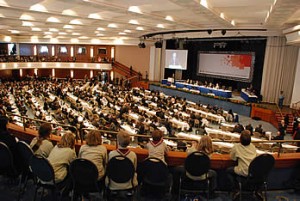~by Joe Perullo
The word Philippine negotiator Bernarditas de Castro-Muller wouldn’t let go unnoticed in yesterday’s small negotiating group meeting on finance was “inadequate.”
The contact group met to discuss possible guidelines on the Global Environment Facility (GEF) and how to manage it’s two sub-funds: the Special Climate Change Fund (SCCF) and the Least Developed Countries Fund (LDCF).
The GEF is the financial mechanism of the UNFCCC, allocating and disbursing about $250 million dollars per year in projects in energy efficiency, renewable energies, and sustainable transportation. The Least Developed Countries Fund (LDCF), established under the United Nations Framework Convention on Climate Change (UNFCCC) at it seventh session in Marrakech, addresses the special needs of the 48 Least Developed Countries (LDCs), which are especially vulnerable to the adverse impacts of climate change. This includes financing National Adaptation Programmes of Action (NAPAs) which address urgent and immediate needs of LDCs to adapt to climate change.
In the contact group, developing countries insisted that financial support for both funds needs to be more predictable and adequate. ‘Predictable,’ means that right now funding for the funds is voluntary, not legally mandatory for developed countries—so nobody knows how much (or little) developing countries can expect to work with. ‘Adequate,’ means two things: there is not enough money in the funds right now, and far too little is expected with voluntary contributions.
So far the GEF has mobilized voluntary contributions of about $172 million for the LDCF. As developed countries keep pointing out, its target in the next 4 years is to reach $500 million, which is the amount estimated by the UNFCCC needed to finance NAPA implementation. The EU claimed this will be reached and is enough. The Philippines wasn’t so sure.
As the meeting time came to a close, the Chair decided to move discussions on the funds to a spin off group, which will include presentations by countries—not just negotiating, but longer prepared speeches.



